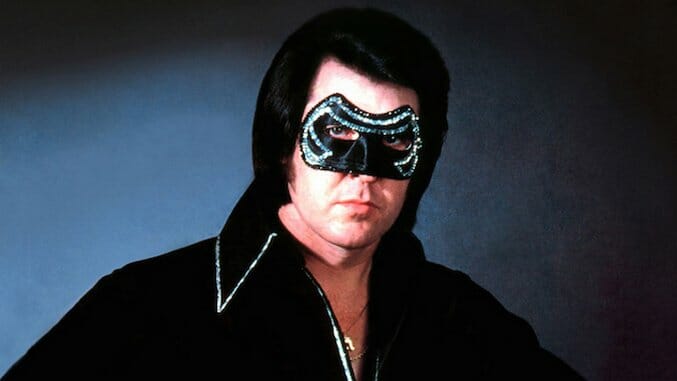
If you can’t beat the Elvis comparisons, exploit them.
Such was the thinking of Shelby Singleton, the Machiavellian Sun Records mogul who saw a nation (read: record buyers) left reeling by Elvis Presley’s death in 1977 and seized the opportunity to unveil a Vertigo-like doppelgänger. Blessed with a high baritone practically indistinguishable from the King’s, Jimmy Ellis also possessed enough of a passing resemblance to Presley that, when adorned in a sequined eye mask, mourners could convince themselves that perhaps their icon had faked his death and adopted a new guise. Consequently, Ellis’ record contract stipulated that he never appear in public unmasked. Sun Records also saw fit to add fuel to the delusional fire by opting for some rising-from-the-grave imagery for the album cover of Orion Reborn.
While certainly outrageous, such dubious gimmickry doesn’t seem particularly uncharacteristic in an industry where images and identities often seem to come courtesy of an assembly line and knockoffs are always in fashion. That said, this latest stranger-than-fiction documentary from Jeanie Finlay (who previously profiled Scotsmen masquerading as California rappers in 2013’s The Great Hip Hop Hoax) poignantly reminds us that it’s also an industry fueled by emotion—be it an artist’s intense need for self-expression or a listener’s desire to discover a song that speaks to them.
Indeed, there’s a longing that lends an unnerving melancholy to Ellis’ balladeering. With great economy, Finlay reveals the details of an early life that saw him put up for adoption by his unwed mother only to languish for three years in boarding homes before finally being taken in by a farming family in Orrville, Alabama. The welcome sign promised living that was easy. Instead, it presented frequent hurdles for Ellis, who waited until his 30s to overcome his family and community’s withering appraisal of his artistic ambitions and finally pursue a music career.
Given this late start, it’s unsurprising that archival interviews with Ellis (who died in 1998) and contemporary recollections from his collaborators and exes (he made a habit of divorcing and remarrying) paint a picture of a man desperately trying to play catch-up. And perhaps it’s due to this sense of urgency that Finlay proves a touch too impatient with Ellis’ songs (recorded both in the guise of Orion and under his own name), offering only brief excerpts from dozens of tracks; a more select sampling might have allowed each song to resonate a little longer and ultimately offer a greater appreciation of the man’s evident talent.
Instead, we’re left to marvel at the collection of outlandish characters who contributed to the Orion legend, be it Singleton (declared the “most-sued man in Tennessee” and easily deserving of his own documentary) or Gail Brewer-Giorgio, the novelist whose fictional resurrected rock star was borrowed wholesale for Singleton’s fictional resurrected rock star. (I refer you back to that “most-sued man in Tennessee” moniker.) There’s also considerable amusement to be found in the film’s parade of pop culture ephemera that illustrates how rumors and urban legends proliferated in a strictly analog world. In fact, Finlay’s documentary would frequently cater in hilarity if she didn’t so diligently depict the torment Ellis endured due to the Faustian bargain that saw him experience fame while having to remain agonizingly anonymous.
With The Great Hip Hop Hoax, Finlay batted around the importance of authenticity and master manipulator Orson Welles was paraphrased but no particular conclusions were arrived at. And with Orion, Finlay also floats out some intriguing theories—Did the fact that Ellis was adopted lay the psychological groundwork for his constant reinventions?—but seems reluctant to delve too deeply into any of them. More often than not, she appears content to traffic in colorful anecdotes rather than risk rigorous analysis.
This bet-hedging tendency ultimately pays dividends in the film’s final passages, where a bold gambit sees Finlay speculate on Ellis’ true bloodlines. As the rationale behind this deduction is methodically revealed, we find ourselves instinctively nodding along, acknowledging that it indeed seems to make perfect sense. But then another thought strikes us: Are we simply being told what we want to believe? And, by buying into this theory, are we every bit as gullible as those Elvis fans who turned a blind eye to the incongruities and accepted Orion as their new King?
Director: Jeanie Finlay
Writer: Jeanie Finlay
Starring: Jimmy Ellis
Release Date: December 4, 2015 (limited)
Curtis Woloschuk is a member of the Vancouver Film Critics Circle, as well as Publications Editor and a programmer for the Vancouver International Film Festival. He’s also a good eater and has a prize ribbon to prove it. You can follow him on Twitter.